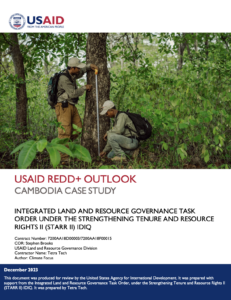 The United States Agency for International Development (USAID), through its missions and implementing partners, supports market-driven climate change mitigation initiatives based on protecting forest landscapes in various countries globally, including Cambodia. Known as REDD+ (reducing emissions from deforestation and forest degradation), these initiatives not only provide environmental and climate benefits, but also generate livelihood and social outcomes for rural, forest-dependent communities. Cambodia is a country that has received significant REDD+ support from USAID since 2012. USAID funding supports up to 10 REDD+ projects which cover key protected areas and forest landscapes.
The United States Agency for International Development (USAID), through its missions and implementing partners, supports market-driven climate change mitigation initiatives based on protecting forest landscapes in various countries globally, including Cambodia. Known as REDD+ (reducing emissions from deforestation and forest degradation), these initiatives not only provide environmental and climate benefits, but also generate livelihood and social outcomes for rural, forest-dependent communities. Cambodia is a country that has received significant REDD+ support from USAID since 2012. USAID funding supports up to 10 REDD+ projects which cover key protected areas and forest landscapes.
The evolution of REDD+ and recent criticisms have raised questions about the integrity and quality of REDD+ voluntary carbon market (VCM) projects (Greenfield, 2023). In this context, USAID seeks clarity on the current landscape of REDD+ and how its bilateral investments can best support REDD+ projects and programs in Cambodia moving forward. This assessment was commissioned to provide USAID and its partners an overview of the current discourse and criticisms of the REDD+ voluntary marketplace, ongoing efforts to address these challenges globally, and the role that USAID funding has played and can continue to play specifically in REDD+ in Cambodia.
This report is structured as follows: Chapter 2 provides an overview of REDD+ as an instrument and the main issues besetting the REDD+ landscape globally today. Chapter 3 delves into the specific context of REDD+ in Cambodia, covering the recent updates of the national-level REDD+ policies and implementation and an overview of the REDD+ activities in the country. It also discusses the role USAID funding has played in REDD+ projects. The final chapter synthesizes the main takeaways for USAID and sets forth concrete recommendations on how USAID can continue to contribute and amplify its investments through REDD+ in Cambodia.

